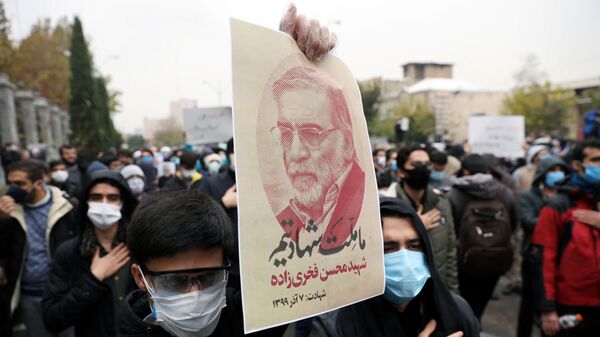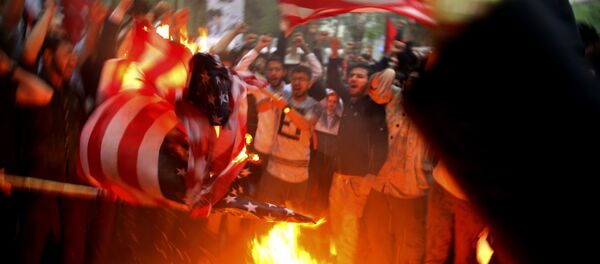Iran continues to suffer the devastating consequences of crushing US sanctions, which were imposed in violation of the internationally-agreed-upon Iran nuclear deal, known as the Joint Comprehensive Plan of Action (JCPoA), as well as the outbreak of coronavirus disease (COVID-19). If Joe Biden assumes the US presidency in January 2021, as it increasingly looks like he will, there may be expectations of a return to the policies of former US President Barack Obama. Tensions, however, have risen greatly following the assassination of Iran's top civilian nuclear scientist, Mohsen Fakhrizadeh, in what many observers consider an attempt to undermine the next administration's ability to negotiate for peace.
Muhammad Sahimi is a professor at the University of Southern California in Los Angeles and an analyst of Iran’s political developments and their relations within the rest of the Middle East. Professor Sahimi explains that despite a great level of resistance from various lobbies and governments around the world, there is a real possibility for an end to the sanctions against Iran, if there is a change of government and change of policy in the United States.
Sputnik: Describe the state of affairs in Iran vis-a-vis the nuclear deal and the consequences of US sanctions that have been re-imposed by the Trump administration.
Professor Muhammad Sahimi: Iran's economy is under the worst possible conditions. Although mismanagement and deep corruption have contributed significantly to the state of the economy, it is the illegal and unilateral sanctions by the United States, as well as the secondary sanctions that the US threatens to impose on any entity doing business with Iran, that has contributed mightily to the current state. The rial, Iran's official currency, has lost much of its value; inflation is 40-50 percent; the price of everything has gone up greatly, and unemployment is high. At the same time, COVID-19 has also hurt Iran, like almost all other nations, and even under such worldwide pandemic, the US has not been willing to relax at least some of its sanctions.
Sputnik: Who are the main actors, domestic and international, that oppose a restoration of the Iran nuclear deal?
Professor Muhammad Sahimi: Domestically, hardliners are opposed to unconditional restoration of the JCPoA. They demand compensation for the damage that Trump's sanctions have inflicted on Iran, and they also say, with some credibility, that the US cannot be trusted. Even if there is to be some negotiation, the hardliners want to lead it themselves, which means by the end of 2021, at the earliest, after the Rouhani administration leaves office.
Internationally [those that oppose restoring the JCPoA are], Saudi Arabia, United Arab Emirates, Egypt and Israel in that region, together with the Israeli and Saudi lobbies in the United States, the neocons, and the evangelical Christians, that are ardent supporters of Israel and represent a strong force within the Republican Party, are opposed to it.
Sputnik: Why do they oppose a nuclear deal between the US and Iran?
Professor Muhammad Sahimi: Internationally, those who oppose the JCPoA are the same as those who want war with Iran, and the toppling of its regime. They have the illusion that the Islamic Republic can be toppled without starting a war that would engulf the entire region. These nations and US factions want, at the very least, to continue the "maximum pressure policy" [implemented by Donald Trump's administration] and complete sanctions against the Iranian people, with the hope that they will rise up and topple the regime, which is another fantasy.
Sputnik: What is currently being done to prevent a future Joe Biden presidency from re-establishing a nuclear deal with Iran and removing the sanctions that have been slapped onto its economy?
Professor Muhammad Sahimi: For nearly three years, and particularly the last several months, the Trump administration has been imposing new sanctions on Iran practically every week, to the point that it has crossed into bizarro-world. The latest sanctions are supposedly in retaliation for Iran's support of terrorism. The goal is to increase the political cost of suspending or cancelling such sanctions, because if the incoming Biden administration tries to do so, it will have to respond to accusations of "supporting a terrorist state". There have also been speculations that Trump and/or Israel might attack Iran, which would lead to a large war that Israel and Saudi Arabia have always craved, hence gutting the door on any type of diplomacy with Iran.
Sputnik: How likely are these attempts to succeed in preventing a future government from inking a renewed nuclear deal with Iran?
Professor Muhammad Sahimi: It all depends on how determined is President-elect Biden and his team to restore the JCPoA and pursue diplomacy with Iran. If they really want to restore the JCPoA, which would open the doors to further diplomacy, they would resist the domestic pressure, and [pressure] by Israel, UAE and Saudi Arabia and move forward. It appears that Mr. Biden really wants to restore the JCPoA, but we would have to wait and see.
Sputnik: Does the current makeup of the US Congress even allow the possibility that a Joe Biden presidency could get a new deal through, given that the Senate appears to be evenly split between the two parties?
Professor Muhammad Sahimi: Yes, that is a significant impediment. But, if control of the Senate changes hands after the runoff elections in Georgia and is transferred to the Democrats, then there will be possibilities.
Sputnik: Trita Parsi, co-founder of the American Iranian Council and the Quincy Institute for Responsible Statecraft, recently suggested that the current attempts to lock future Biden government into the current status quo "may force him to go bigger than just restoring the agreement". Do you agree?
Professor Muhammad Sahimi: I agree with Dr. Parsi. If Biden restores the JCPoA and begins negotiations with Iran over other issues, then he can present them as a comprehensive solution to some of the most complex problems in the Middle East. In my opinion, the American people are tired of endless wars, and their economic and human costs, particularly in the Middle East. But, peace will not prevail in that region without negotiations between the US and Iran, and resolving at least some of the major issues between the two nations. Under such circumstances, President Biden will be able to present this to the American people.





